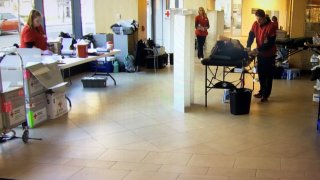
Yale New Haven Health workers rolled up their sleeves Thursday and got to work. The employees on the front line of the coronavirus fight made life-saving donations.
“The people who work in healthcare tend to be pretty service orientated to begin with and it’s another way we can try to be helpful,” said Samuel Miller, a surgical resident at Yale New Haven Hospital.
At an employee-only blood drive, Yale New Haven Health and Yale University came together to help a medical crisis on the horizon: a possible shortage of blood.
“I know that we’re getting near having a blood shortage and that’s pretty scary in general, but especially as a healthcare provider,” said nurse practitioner and midwife Ash Draper. “So anything we can do to help our community more.”
With local blood drives cancelled because schools, colleges and businesses are closed to the coronavirus, the American Red Cross joined the Yale community.
“Nationwide we are down 6,000 blood drives and over 200,000 units of blood, so we are in what I call a critical need,” said Lynne Phillips, district manager for the American Red Cross.
The organization collects nearly 42 percent of the nation’s blood supply. Donations typically last 42 days, although platelets and plasma expire sooner.
Local
“More than likely it will go somewhere in Connecticut, but if there’s a dire need somewhere we could potentially send it somewhere else,” said Phillips.
The Red Cross is looking for more places around the state to host blood drives. They’re following protocol every step of the way, checking temperatures at the door, wearing protective equipment and following CDC guidelines.
“The most important thing we’re doing is the social distancing so we’re requiring everybody to be six feet apart,” said Phillips.
And Yale is keeping an eye on those out front who are giving so much.
“We tend to say we want to lead from the front so that we’re here and visible, but the reality is we’re also trying to pace ourselves, spell people on and off,” said Marna Borgstrom, CEO of Yale New Haven Health. “Because we can’t afford to have our own staff get sick, we’re as exposed as anybody else, perhaps more so.”



